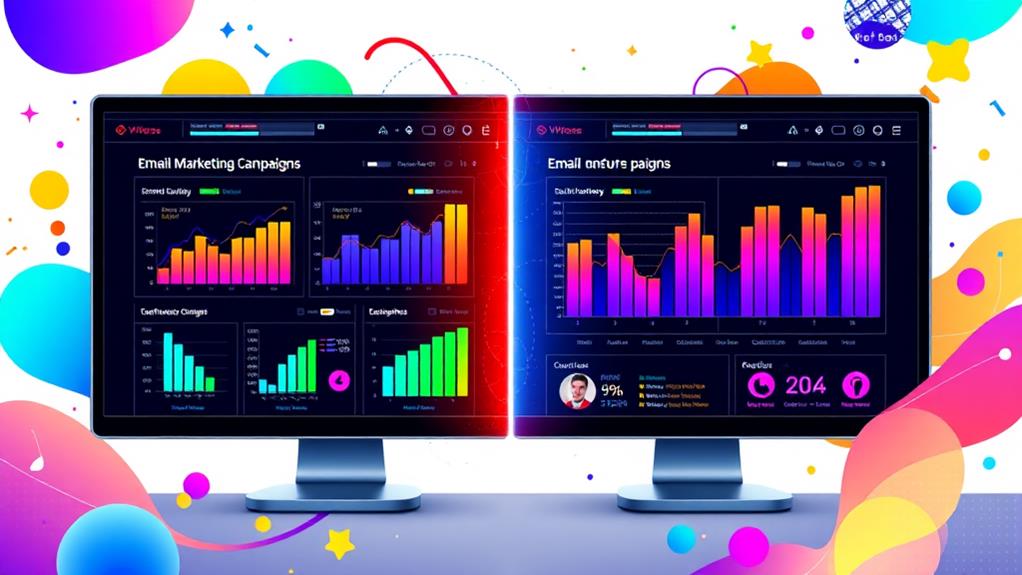Small businesses can accelerate growth by embracing email marketing's power, which offers an impressive average ROI of $38 for every $1 invested. With 77% of B2B consumers favoring email, businesses can guarantee effective communication by maintaining robust and well-targeted email lists. Personalized campaigns—favored by 72% of consumers—enhance engagement, which can be further refined through segmentation and dynamic content. Automation streamlines tasks and boosts personalization, driving significant revenue, such as a potential 15% increase from automated cart follow-ups. Continuously measuring campaign success with KPIs guarantees strategic adjustments, paving the way for sustained growth. Discover how to maximize this potential.
Key Takeaways
- Small businesses can achieve a high ROI by investing in cost-effective email marketing strategies.
- Building a robust email list through incentives and pop-up forms enhances audience reach and engagement.
- Personalized emails with targeted messaging increase customer interaction and drive growth.
- Email automation saves time and boosts engagement through timely, behavior-based communications.
- Analyzing email performance metrics enables continuous optimization for improved campaign effectiveness.
Importance of Email Marketing
As small businesses navigate the competitive landscape, email marketing emerges as an essential tool, offering a remarkably high return on investment, with an average of $38 gained for every dollar spent. This compelling ROI underscores email marketing's cost-effectiveness, making it an attractive strategy for businesses operating on limited budgets.
With 77% of B2B consumers preferring email for marketing communications, email trends clearly demonstrate its efficacy in reaching and engaging target audiences.
Moreover, the power of personalization cannot be overstated. Personalized email campaigns greatly enhance audience engagement, with 72% of consumers expressing a preference for tailored communications from brands they trust. This inclination towards personalization highlights the importance of crafting messages that resonate on a personal level, thereby fostering stronger connections and driving customer loyalty.
Regular newsletters are another valuable component of a robust email marketing strategy, with 45% of marketers sending them weekly to maintain and nurture long-term customer relationships.
The strategic advantage of email marketing is further amplified by its trackability. Businesses can monitor critical performance metrics, such as open rates and click-through rates, to measure success and refine their strategies. This data-driven approach guarantees continuous improvement and optimized audience engagement.
Building Your Email List
Developing a robust email list is a strategic necessity for small businesses aiming to maximize their marketing efforts. Leveraging pop-up strategies is essential; placing well-optimized sign-up forms and landing pages prominently on your website can greatly enhance conversion rates.
These forms should be strategically timed and visually engaging to capture the attention of visitors without disrupting their browsing experience. Additionally, harnessing social media's broad reach can amplify your email list-building efforts. Promote email subscriptions by offering exclusive content or discounts, tapping into vast online audiences enthusiastic for value.
Incentive programs are another powerful tool to encourage sign-ups. Implementing in-store strategies, such as collecting emails at the point of sale and offering discounts or freebies, can effectively increase your subscriber base.
Complement this with valuable lead magnets, like free e-books or guides, which enhance the perceived value of subscribing. These incentives not only attract new subscribers but also build loyalty and engagement.
To maintain the importance of your email list, regular cleaning is necessary. Removing inactive subscribers and monitoring bounce rates guarantees compliance with legal standards and keeps your list engaged, ultimately driving sustainable, long-term growth in your email marketing endeavors.
Crafting Effective Campaigns
A robust email list sets the stage for impactful marketing, but the true potential lies in crafting effective campaigns that engage and convert. To achieve this, small businesses must focus on several key elements of email marketing.
- Subject Lines: Craft compelling subject lines that incorporate action words and a sense of urgency. This approach is proven to greatly increase open rates by capturing the recipient's attention immediately.
- Calls to Action (CTAs): Integrate clear, persuasive calls to action throughout your emails. Utilize contrasting colors and action-oriented text to enhance click-through rates and drive conversions.
- Consistent Design: Maintain a consistent and visually appealing email design that aligns with your branding. This fosters recognition and enhances the user experience, making recipients more likely to engage with your content.
- A/B Testing: Continuously A/B test different email elements, such as subject lines and CTAs, to identify what resonates best with your audience. This strategic approach improves overall campaign effectiveness over time.
Personalization and Segmentation
Optimizing email marketing through personalization and segmentation is a strategic approach that greatly boosts engagement and conversion rates. By leveraging targeted messaging, small businesses can tailor their emails to resonate with individual subscribers, leading to a 72% increase in engagement rates. Personalization transforms generic content into meaningful communication, striking a chord with recipients on a personal level.
Segmentation further refines email marketing strategies by utilizing audience insights to categorize subscribers based on demographics and preferences. This method allows businesses to craft campaigns that are not only relevant but also highly effective. According to 78% of marketers, segmentation is indispensable for delivering tailored messages that meet specific audience needs, ensuring that each email serves a purpose beyond mere communication.
Moreover, the integration of machine learning for dynamic segmentation offers a sophisticated approach to identifying nuanced audience segments. This advanced technique enhances marketing efforts by transcending basic demographics, resulting in more precise and impactful messaging.
For small businesses, embracing these data-driven strategies not only maximizes the potential of email marketing but also positions them for sustained growth by ensuring each communication is purposeful and aligned with the audience's desires and expectations.
Leveraging Email Automation
Leveraging email automation is a strategic move for small businesses aiming to streamline repetitive tasks while enhancing personalization efforts.
By automating workflows such as welcome emails and follow-ups, businesses can consistently engage with their audience with minimal effort and at ideal times, which has been shown to boost open rates by up to 20%.
Additionally, the ability to send personalized, timely messages based on user behavior not only increases engagement rates by 30% but also aligns with consumer preferences, as 72% of consumers engage only with personalized content.
Streamline Repetitive Tasks
In the domain of small business operations, streamlining repetitive tasks through email automation is a strategic move that can greatly improve efficiency and effectiveness.
By integrating automation into email marketing, businesses can achieve remarkable time efficiency and superior task management. This approach not only reduces the manual workload but also guarantees that essential communications are executed flawlessly.
Consider these data-driven strategies:
- Welcome Emails: Automatically send welcome emails to new subscribers, fostering immediate engagement and laying the groundwork for a lasting relationship, all without manual intervention.
- Abandoned Cart Follow-Ups: Implement automated follow-up emails for abandoned carts, which can boost conversion rates by 10% to 15%, reminding potential customers to finalize their purchases.
- Drip Campaigns: Utilize drip campaigns to nurture leads over time, adapting messages based on user actions. This can lead to a 65% increase in engagement, as reported by many marketers.
- Dynamic Segmentation: Leverage automation tools to dynamically segment email lists. This facilitates personalized communication, which has been shown to boost open rates by up to 29%.
Enhance Personalization Efforts
Streamlining repetitive tasks through email automation greatly enhances efficiency, setting the stage for the next frontier: personalized communication. For small businesses, leveraging email automation to tailor messages based on customer behavior can increase engagement rates by up to 72%. This strategic use of dynamic content allows businesses to send personalized offers and recommendations, considerably boosting message relevancy and customer connection.
Automated welcome emails serve as a powerful initial touchpoint, acknowledging new subscribers and potentially increasing orders by 90%. This showcases the critical role of timely, personalized communication in fostering customer loyalty.
Furthermore, small businesses can utilize automation tools to schedule follow-up emails, such as reminders for abandoned carts or post-purchase follow-ups, which are proven to improve conversion rates.
Additionally, by integrating AI-driven systems, businesses can optimize email send times according to individual customer activity patterns. This data-driven approach guarantees that emails are opened and read, maximizing overall engagement and efficiency.
Ultimately, enhancing personalization through email automation not only refines customer interaction but also strategically positions small businesses to drive growth by delivering highly relevant content tailored to specific customer behaviors and preferences.
Measuring Campaign Success
How do small businesses determine the true impact of their email marketing campaigns? Success hinges on strategic KPI analysis, where open rates (ideally 17%-28%), click-through rates (CTR) (ideally 2%-5%), and conversion rates (also ideally 2%-5%) are essential indicators. By examining these metrics, companies can effectively gauge the efficacy of their outreach.
Monitoring subscriber trends is equally important, as it provides insights into audience growth and engagement.
- A/B Testing: By experimenting with elements like subject lines and call-to-action buttons, businesses can refine strategies to align with audience preferences, enhancing campaign optimization.
- Engagement Metrics: Utilizing analytics tools to track click-through rates allows businesses to identify content that resonates most with their audience, enabling more targeted content creation.
- Customer Feedback: Direct feedback offers invaluable insights, helping companies fine-tune their approaches and strengthen customer relationships.
- Campaign Optimization: Continuous analysis of engagement patterns guarantees that email strategies are consistently improved for better outcomes.
Incorporating these data-driven methods empowers small businesses to not only measure, but also enhance, the success of their email marketing efforts, driving sustainable growth and stronger customer connections.
Frequently Asked Questions
How Email Marketing Can Boost Your Business Growth?
Email marketing can considerably boost business growth by effectively reaching the target audience through personalized campaigns. This approach enhances engagement and retention, leveraging data-driven strategies to optimize ROI and build lasting customer relationships.
Why Is Email Marketing Good for Small Businesses?
Email marketing is advantageous for small businesses due to its ability to effectively reach the target audience. Campaign personalization enhances engagement and fosters loyalty, while data-driven insights enable optimization, ensuring strategic growth and maximizing return on investment.
How to Grow a Small Business Using Digital Marketing?
To grow a small business using digital marketing, develop a robust content strategy and utilize precise audience targeting. This approach enhances engagement and conversion rates, leveraging data-driven insights to refine tactics and achieve sustainable business growth.
How Small Businesses Can Benefit From Digital Marketing?
Small businesses can leverage digital marketing, particularly through social media and content marketing, to enhance brand visibility, engage target audiences, and drive conversions. Strategic data-driven approaches guarantee maximized ROI by effectively reaching and influencing potential customers.
Conclusion
Email marketing serves as a pivotal tool for small businesses seeking growth, offering a strategic advantage through cost-effective communication. By focusing on building a robust email list, crafting compelling campaigns, and employing personalization and segmentation, businesses can enhance engagement and conversion rates. Leveraging automation technologies streamlines processes and maximizes efficiency. Measuring campaign success through data analytics provides insights for continuous improvement, ensuring that email marketing remains a powerful driver of business growth in an increasingly competitive market.




